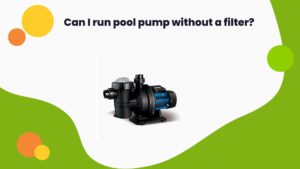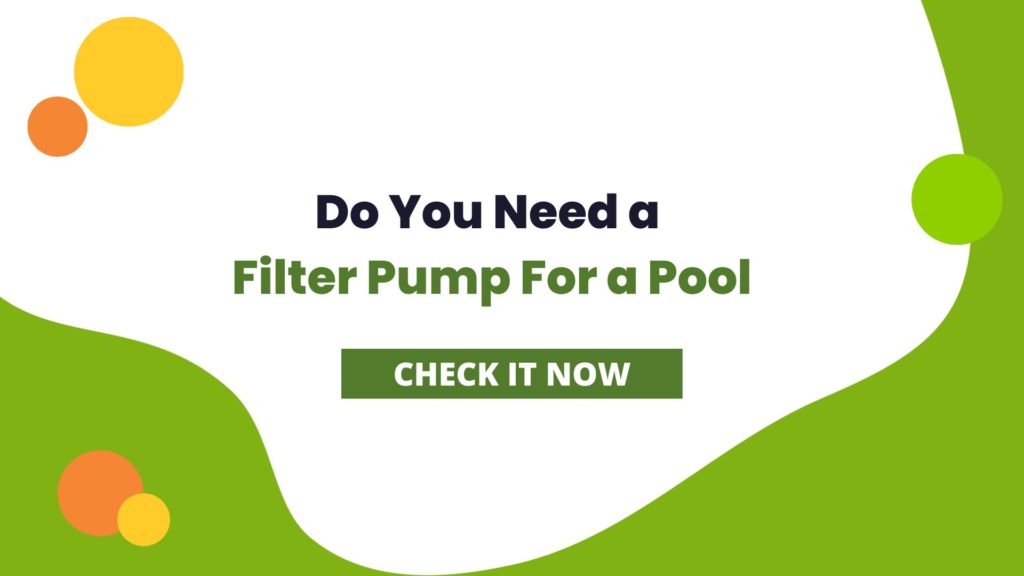When you’re enjoying your pool on a sunny day, there’s a quiet helper at work—the filter pump. But have you ever wondered, “Do you really need a filter pump for a pool?” Let’s dive into this question Do You Need a Filter Pump For a Pool and understand why it’s essential for keeping your pool clean and enjoyable.
Think of the filter pump as your pool’s silent hero. It works quietly but plays a big role in keeping your pool clean and cozy for relaxation. By getting rid of leaves and dirt, it ensures your pool stays in top shape.
Beyond just looking good, the pump also helps keep the water healthy by moving it around and keeping it clean. This way, your pool time becomes even more enjoyable and fun.

Table of Contents
ToggleWhy Do you Need a Filter Pump For a Pool?
Imagine your pool as a living, breathing entity, and the filter pump as its heartbeat. It’s not just a fancy accessory; it’s a fundamental player in maintaining water clarity and quality. Here’s why you might want to consider having one:
1. Filtration Magic:
Pool water, over time, becomes a magnet for debris, leaves, bugs, and other contaminants. A filter pump acts as a superhero, tirelessly working to remove these unwanted intruders. This not only keeps your pool visually appealing but also ensures a healthier swimming environment.
2. Chemical Balance:
A filter pump contributes to the overall chemistry of your pool. By circulating the water, it aids in distributing chemicals evenly. This means no more awkward cold spots or uneven distribution of sanitizers. Consistent circulation helps maintain a perfect balance, keeping both your skin and the pool equipment happy.
3. Cost-Efficient Maintenance:
Think of a filter pump as an insurance policy for your pool. By regularly circulating and filtering the water, you reduce the likelihood of larger issues arising. This translates to fewer maintenance headaches and, ultimately, more money in your pocket.
4. Extended Equipment Life:
Just as regular exercise keeps your heart healthy, a filter pump keeps your pool equipment in top shape. The continuous circulation prevents stagnant water, reducing the risk of corrosion and extending the life of your pool components.
Addressing Common Concerns:
1. Energy Consumption:
Worried about energy bills? Opt for energy-efficient pumps and set them on timers. This way, you can strike a balance between maintaining water quality and managing energy consumption.
2. Size Matters:
When choosing a pump, consider the size of your pool. A pump too large can lead to unnecessary energy costs, while one too small might not effectively circulate the water. Find the Goldilocks zone that suits your pool’s needs.

Can I Run Pool Pump Without a Filter?
The filter is a crucial component of your pool’s circulation system, and its primary function is to remove debris, dirt, and other particles from the water.
Here are a few reasons why running a pool pump without a filter is not advisable:
Water Quality:
- The filter is essential for maintaining good water quality by trapping and removing impurities. Without a filter, debris and contaminants would remain in the water, leading to cloudy or dirty pool water. This can affect the aesthetics of your pool and make it less enjoyable for swimming.
Equipment Protection:
- The filter also helps protect other pool equipment, such as heaters and pumps, by preventing debris from entering and causing damage. Running the pump without a filter increases the risk of clogging and damage to these components.
Balancing Chemicals:
- The filter plays a role in distributing pool chemicals evenly throughout the water. Without proper circulation through the filter, achieving and maintaining the right chemical balance becomes challenging. This could result in uneven distribution of sanitizers and other chemicals, affecting the effectiveness of water treatment.
Algae Growth:
- Stagnant water is more prone to algae growth. The filter helps in removing algae spores from the water, preventing the formation of algae blooms. Without filtration, you may find it more challenging to control and prevent algae in your pool.
While it’s technically possible to run a pool pump without a filter for short periods in certain situations (such as when you’re replacing a filter), it’s not a recommended long-term practice. If you’re facing issues with your filter, it’s best to address the problem promptly by repairing or replacing the filter rather than bypassing it altogether.
Regular maintenance and proper functioning of all pool components contribute to a clean, healthy, and enjoyable swimming environment.

How To Install Swimming Pool [ Filter Pump ]
Installing a swimming pool filter pump can be a straightforward DIY task. Follow these steps:
Method 1: Do It Yourself
- Select the Right Location: Choose a flat, stable surface near the pool for the pump. Ensure it’s close to an electrical outlet.
- Position the Pump: Place the pump on a level surface and secure it using mounting bolts or brackets.
- Connect the Hoses: Attach the intake hose to the pool skimmer and the discharge hose to the return fitting on the pool.
- Secure the Connections: Tighten hose clamps securely to prevent leaks.
- Plug In: Connect the pump to a power source using a grounded electrical outlet. Make sure the pump is properly grounded for safety.
- Prime the Pump: Open the pump lid, fill the basket with water, and close the lid tightly. This primes the pump and helps with efficient operation.
- Check for Leaks: Turn on the pump and inspect all connections for leaks. Adjust as needed.
- Monitor Pressure: Keep an eye on the pressure gauge. Clean or replace the filter as necessary to maintain optimal performance.
Method 2: Professional Installation Services
For a hassle-free experience, consider enlisting the expertise of a professional swimming pool service team:
Professional Assistance:
Engage a reputable swimming pool service provider for a seamless filter pump installation. These professionals bring valuable experience to ensure the pump is correctly placed and connected for optimal performance.
Conclusion:
In the grand symphony of pool maintenance, the filter pump plays a melodious tune. It’s the unsung hero that ensures your pool remains a haven of relaxation and joy. So, do you need a filter pump for a pool? Absolutely. It’s not just a matter of convenience; it’s a commitment to the longevity and vitality of your aquatic escape. Invest in one, and let the rhythm of clean, clear water harmonize with your poolside bliss. Happy swimming!

